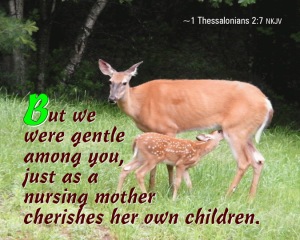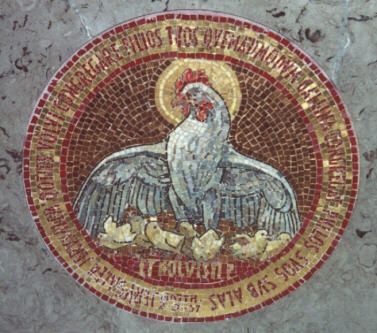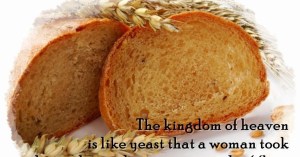“Caring for You!”

1 Thessalonians 2:6-10 – August 27, 2023
Anyone here familiar with any religious leaders who are puffed up? Proud beyond measure? Strutting their stuff? I mean, lording it over their congregations and everyone else? Some preachers and evangelists can be like that. Don’t bother the extra special holy person!
It doesn’t seem like those puffed-up preachers or evangelists care about anyone! Not any common, ordinary folk from their congregations, anyway.
That kind of self-centered, self-satisfied attitude is the problem with certain people, and this is not exclusive to preachers or evangelists. Lots of people can have really skewed priorities and end up ignoring people who hurt, or those who are sad or depressed, or people who grieve all manner of losses. Or even worse, these blinded, entitled people are aware of those who cry out for help, but simply shut the door in their faces.
I’d like us to focus on several verses from this reading today. They come from the apostle Paul’s letter to the believers in Thessalonica. Starting at verse 6: “We were not looking for praise from people, not from you or anyone else, even though as apostles of Christ we could have asserted our authority. 7 Instead, we were like young children among you. Just as a nursing mother cares for her children, 8 so we cared for you. Because we loved you so much, we were delighted to share with you not only the gospel of God but our lives as well.”
What does Paul make a point of saying here? Paul and his friends did not want to be treated like something super special! They were not hungry for praise, or seeking strokes and adulation from their fellow believers in town. Certainly, Paul and his friends were in what is known today as a teacher or mentor position among their friends, but not high on a pedestal. And especially not puffed up.
Paul points out, “We proved to be gentle among you.” Like young children!
“This is another example of positive and gracious leadership. Paul was not a like a dictator to the Thessalonians. Instead, he chooses one of the most tender images in all of nature, a nursing mother. Some of us here may be inclined toward “tough love.” We might say, ‘my way or the highway.’” [1] But, not Paul! He purposely meant to come alongside his Thessalonian friends gently, and he demonstrated that his co-workers were, too.
This nurturing, maternal reading is not common within the apostle Paul’s letters, since he was more likely to use strong, masculine word-pictures or metaphors. However, using these words of maternal love and affection here show us the loving heart of Paul, and how much he cared for these believers. And not only that, Paul and his friends were ready and eager to share all that they had with the Thessalonians.
Commentator F.F. Bruce makes the connection that “No other attitude would befit the preachers of a gospel which proclaimed as Lord and Savior one who ‘emptied himself’ (Phil 2:7) for the enrichment of others.” [2] We can see our Lord Jesus showing the ultimate in loving, caring affection in Philippians 2, as He emptied Himself of all Godly prerogatives and attitudes, and set all his Godhood aside. Our Lord Jesus became a human being so He could communicate on the same level, and more easily and directly with us fellow human beings.
Similar to what Paul just said in this letter to the Thessalonians, Jesus did not throw His weight around! No, Jesus was not on a pedestal or puffing up His chest because He was so high and mighty. Can you possibly imagine Jesus doing things like that? Absolutely not!
Just so, Paul imitates his Lord Jesus by showing that he and his companions are not hungry for praise, or seeking strokes and adulation from their fellow believers in Thessalonica.
Paul specifically says he and his friends tenderly care for their Thessalonian friends in the church. The Greek word he uses here is thalpo, “to warm, cherish, nourish.” How nurturing is that! This is the same word used in the Greek translation of the Hebrew Scriptures for a Scripture reading we examined earlier this summer: Deuteronomy 22:6, where mother birds cover her young or her eggs with their feathers.
That is not all! This Greek word thalpo, “to warm, cherish, nourish,” is used again by the apostle Paul in Ephesians 5:29. Here he describes our risen Lord Jesus Christ and His care for the church universal. How wonderful that the Lord Jesus Christ continues the same caring, nurturing activity He regularly displayed during His time here on Earth as a human being. Commentator F.F. Bruce adds, Paul’s words “’For her own children’ would stress the personal involvement and concern. A mother who is nursing her children does not and cannot turn the care of her child over to someone else. She feeds, loves, and protects her child.” [3]
Helping people to grow in the Lord, as with growing children, takes time and requires patience, just as much today as 2000 years ago. Sometimes it causes pain and grief, and priorities need to be set in our relationships. We don’t raise children overnight, You and I can’t raise them without growing pains for both parent and child alike. [4]
If we recognize our deep need for nurture, protection and caring from all that would harm us, we can also watch out for one another! Jesus urges us to nurture, protect, and care for one another, too. As our loving, caring Lord Jesus always does for us. Without fail.
Praise God, God has been loving, caring and full of nurture for us all. God is our nurturing Parent, and that’s a blessed fact. Alleluia, amen.
(Suggestion: visit me at my other blogs: matterofprayer: A Year of Everyday Prayers. #PursuePEACE – and A Year of Being Kind . Thanks!
(I would like to thank the website www.bible.org for their commentary and bible study on today’s New Testament reading, https://bible.org/seriespage/4-compelling-example-ministry-1-thess-21-12. I got several excellent ideas and quotes for this sermon from this excellent article.)
[1] https://studyandobey.com/inductive-bible-study/thessalonians-studies/1thessalonians2-1-9/
[2] https://bible.org/seriespage/4-compelling-example-ministry-1-thess-21-12
[3] Ibid.
[4] Ibid.



